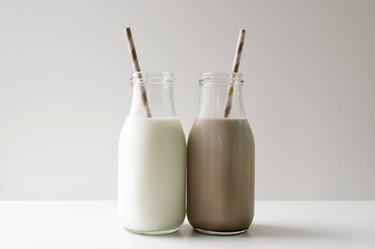
Though you might think of it as a childhood "junk" food, chocolate milk can actually fit into an active, healthy lifestyle. It's higher in calories than plain milks, giving it a nutritional advantage when you're trying to gain weight. Not only does chocolate milk supply calories you need to gain pounds, but it can help you recover from workouts, including those designed to help you gain muscle.
Calories, Chocolate Milk and Weight Gain
Video of the Day
Chocolate milk is relatively high in calories, so it's a good choice for weight gain. A cup of whole chocolate milk has 208 calories, compared to 149 calories in a cup of whole white milk. Chocolate milk also has more than double the calories of nonfat white milk, which supplies 83 calories per cup.
Video of the Day
Simply drinking a glass of chocolate milk in addition to your regular meals is enough to trigger significant weight gain. If you did that every day, you'd gain just under 0.5 pound per week -- slightly less than the recommended weight gain rate of 0.5 to 1 pound weekly.
Calorie-rich drinks boost your daily energy intake, but they're not filling like solid food. So if you already feel satisfied with your current meal plan, you can likely drink an extra glass of chocolate milk each day to meet your goals without feeling weighed down or like you've overeaten.
Weight-Gain Benefits of Protein
Chocolate milk serves as a good source of protein, which can help you gain lean mass. Gaining muscle tissue is important -- healthy muscles not only make you feel strong and support your active lifestyle, but they support your posture to make you look your best. Building new muscle requires amino acids, the building blocks of protein, as well as a strength-training program targeted at muscle growth, which you perform two to three times weekly
Active adults who strength-train regularly need between 0.6 and 0.8 gram of protein per pound of body weight to support muscle growth. For a 120-pound person, that works out to 72 to 96 grams daily; for a 160-pound person, it's to 96 to 128 grams. Each cup of chocolate milk contributes 8 grams toward this protein goal.
Drinking Chocolate Milk After a Workout
Gaining lean mass requires strenuous workouts, and chocolate milk can provide nutritional support. Simply eating protein shortly after a workout boosts skeletal muscle remodeling -- an early step in muscle growth -- notes a review published in the International Journal of Sport Nutrition and Exercise Metabolism in 2015.
Chocolate milk, specifically, appears to help you recover after a tough workout, according to a study published in Applied Physiology, Nutrition and Metabolism in 2015. The study looked at a dozen judo athletes practicing a rigorous training schedule and compared the effects of chocolate milk to water on stress levels and recovery. The researchers found that the athletes who drank chocolate milk performed better on strength and fitness tests than their water-drinking counterparts, kept the athletes' spirits high even during intense training and triggered hormone changes that are conducive to muscle growth.
In other words, the study indicates that chocolate milk might offer benefits to help you feel more motivated in your workouts, improve your performance and potentially help you see better results. But larger and longer-term studies are still needed to confirm these results and to know how well chocolate milk works in nonathletes.
Nondairy Chocolate Milk Works, Too
Although chocolate milk might help with weight gain, it's not good for everyone. It won't fit into a vegan diet, and if you have lactose intolerance, drinking chocolate milk might cause digestive side effects that make it hard to hit your calorie goals -- not to mention work out.
You might get similar benefits from nondairy chocolate beverages, however, according to a study published in International Journal of Sport Nutrition and Exercise Metabolism in 2015. The researchers compared the effects of chocolate dairy milk with chocolate soy milk and chocolate hemp milk on post-exercise recovery in cyclists. They found that each of the beverages offered roughly the same benefits.
If you need to avoid dairy, try chocolate soy milk instead. While it's not as high-calorie as whole chocolate milk, it still supplies 153 calories per cup. And because it's also relatively high in protein -- at 6 grams per cup -- it supports muscle growth for lean weight gain.
- University of Colorado: Eating Strategies to Gain Weight
- HealthAliciousNess: Nutrient Fats Comparison Tool (Milk, Chocolate Milk, Chocolate Almond Milk)
- Brown University: Sports Nutrition
- International Journal of Sport Nutrition and Exercise Metabolism: Post-Exercise Dietary Protein Strategies to Maximize Skeletal Muscle Repair and Remodeling in Masters Endurance Athletes: A Review
- Applied Physiology, Nutrition and Metabolism: Effects of Acute Postexercise Chocolate Milk Consumption During Intensive Judo Training on the Recovery of Salivary Hormones, Salivary SIgA, Mood State, Muscle Soreness, and Judo-Related Performance
- International Journal of Sport Nutrition and Exercise Metabolism: Cycling Time Trial Performance 4h Following Glycogen-Lowering Exercise Is Enhanced Similarly With Recovery Non-Dairy Chocolate Beverages vs Chocolate Milk
- HealthAliciousNess: Nutrient Fats Comparison Tool (Skim Milk, Chocolate Soy Milk)